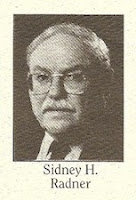The first issue to carry the new Mystifier name was released in the Third Quarter of 1992. The newsletter kicks off with a terrific article by William M. Doerflinger who, as a boy, saw Houdini do his vanishing elephant at the New York Hippodrome. What a memory! Here's an excerpt:
To a round of applause, Houdini and the ponderous elephant appeared from the wings, walked to center stage, and saluted the audience. A very large, slightly rectangular cabinet, curtained along one of its long sides, had been pushed on stage by assistants. It was shown to be empty. The docile elephant lumbered up a short ramp and into the cabinet. The curtains were drawn. The cabinet was then slowly rotated, and left with its curtained side toward the audience. Houdini walked to the cabinet and whisked apart the curtains. We looked into an empty cabinet and through a circular opening, much too small for the elephant to pass through, in its rear wall. The elephant was gone.
The newsletter continues with "A Tale of Two Trunks" by Morris N. Young in which he examines a second trunk Houdini used to carry his escape tools. The HHC Endowment Fund is then discussed. We then get a lengthy first draft article by Houdini on "Historical Lock Pickers", edited and annotated by collector and manuscript owner Manny Weltman.
In his "Backstage" column, Sid Radner reports on the success of the recent Magic Collectors' convention in Appleton, saying, "we had the greatest every gathering of Houdini experts ever assembled one area!" He also notes that "six or more books by convention attendees are in the works, the first of which, by Pat Culliton, had a September publication date." That book was Houdini's Strange Tales.
The newsletter concludes with news of new postcards in the museum shop.
Mystifier
Volume 2, Number 3
Third Quarter, 1992
6 pages
Contents:
Seeing the Elephant Vanish
A Tale of Two Trunks
HHC Endowment
Queries
Historical Lock Pickers
Backstage with Sid Radner
Related:
- Delving into The Mystifier file
- 100 years ago Houdini vanished an elephant
- Hear 'Houdini’s Strange Tales' on CD


Doerflinger's memory of the Hippodrome elephant vanish is definitely in keeping with the Jarrett/Steinmeyer/Culliton mirror explanation. The curtain in the front--not the rectangular long side--and the circular opening in the back.
ReplyDeleteActually, his memory contradicts that theory which says the audience was looking through a hole in the FRONT of the cabinet. He makes specific note of this later. I quoted that in my 100 years post.
DeleteWait a minute--Doerflinger noted that the circular opening was in the rear wall of the cabinet:
DeleteWe looked into an empty cabinet and through a circular opening, much too small for the elephant to pass through, IN ITS REAR WALL. The elephant was gone.
Yes, correct. He says the opening was ONLY in the rear. The front was wide open. The Steinmeyer explanation says there was round opening front and rear. Doerflinger specifically refutes this. Here's his quote:
Delete"Some later commentators suspected that the audience had looked through a circular opening at the front of the cabinet as well as through the back, somewhat as though the cabinet was a huge Phantom Tube. My own visual image agrees with those who say there was no circular opening at the front; it was completely curtained until Houdini drew the curtains aside."
Reading the whole account in the Mystifier above, Mr. Doerflinger also mentions women with torches wading and disappearing into a 30-foot-wide tank of water that was revealed in a separate act and was apparently below the center of the stage (he mentioned it as assurance to the audience that the elephant couldn't have escaped through a trap door in the stage floor). I was curious about that act so I checked my Hippodrome program, but the acts before and after Houdini appeared to be mostly musical play vignettes, except for the opening number which was called "The Beginning of the World", with women playing the Sun, Moon, Night, and the Rainbow "and her attendants" - so perhaps that was the attraction he referred to. It would certainly make for a spectacular opening of the program, and I'm sure Houdini appreciated its inclusion in the performance! (The design of the Hippodrome must have been extraordinary for the times to handle such immense and complicated effects.)
ReplyDeleteTrue! Houdini also used that tank to do an overboard box escape during this same 1918 run, and he also did an underwater full body straitjacket escape as a challenge.
DeleteYou'll here quite a bit that the "water tank below the stage" made trap doors impossible, but Pat Culliton shows a diagram of the Hippodrome stage in his "Notes on the Vanishing Elephant" and you can see the tank is actually out in front to the stage area. So traps were possible.
Great! Thanks for the info, John!
Delete